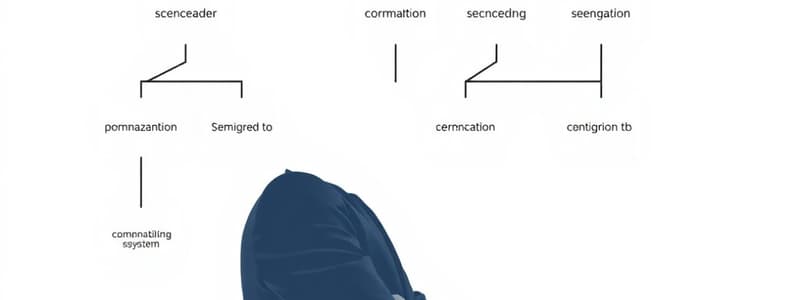Podcast
Questions and Answers
A manager is _____________________________.
A manager is _____________________________.
Responsible for achieving organizational objectives
Name the four types of resources.
Name the four types of resources.
human-people, financial-capital, physical-inventory/equipment, informational -training/knowledge
Name the functions of a manager.
Name the functions of a manager.
planning, organizing, leading, and controlling
What is the 'planning' function of management?
What is the 'planning' function of management?
What is the 'controlling' function of management?
What is the 'controlling' function of management?
A Top Manager participates in what managing activities?
A Top Manager participates in what managing activities?
A Middle Manager participates in what managing activities?
A Middle Manager participates in what managing activities?
A First-Line Manager participates in what managing activities?
A First-Line Manager participates in what managing activities?
What management style is for the lowest level worker and is very directive?
What management style is for the lowest level worker and is very directive?
What management style is for the moderate capability? It is directive but includes the 'why' aspect of why we do things the way we do.
What management style is for the moderate capability? It is directive but includes the 'why' aspect of why we do things the way we do.
What management style is for the high capability worker, support and involved in their task/decision making?
What management style is for the high capability worker, support and involved in their task/decision making?
What management style is for the outstanding worker that is self sufficient?
What management style is for the outstanding worker that is self sufficient?
Theory is what?
Theory is what?
Capability is _______ + ________.
Capability is _______ + ________.
What is the Hawthorne Effect?
What is the Hawthorne Effect?
What is the Classical theory?
What is the Classical theory?
What does Theory X/Theory Y state?
What does Theory X/Theory Y state?
What does systems theory state?
What does systems theory state?
What does contingency theory state?
What does contingency theory state?
What does behavioral theory state?
What does behavioral theory state?
What is the External Environment?
What is the External Environment?
What is scientific management?
What is scientific management?
__________ is the values, beliefs, actions and appropriate behavior that members share
__________ is the values, beliefs, actions and appropriate behavior that members share
What is level 1 of culture?
What is level 1 of culture?
List the order of Onion Layers.
List the order of Onion Layers.
What is the Global Environment?
What is the Global Environment?
What are whistle blowing programs?
What are whistle blowing programs?
List the 5 Artifacts/Elements of Culture.
List the 5 Artifacts/Elements of Culture.
What is the FOUR WAY TEST?
What is the FOUR WAY TEST?
What is the Glad you asked method?
What is the Glad you asked method?
What is an organizational code of conduct?
What is an organizational code of conduct?
What is the Stakeholders Approach?
What is the Stakeholders Approach?
What is the Three step checklist?
What is the Three step checklist?
"Its not my fault" is justifying unethical behavior by what?
"Its not my fault" is justifying unethical behavior by what?
"it was the groups fault" is justifying unethical behavior by what?
"it was the groups fault" is justifying unethical behavior by what?
"I'm not as bad as ______." is justifying unethical behavior by what?
"I'm not as bad as ______." is justifying unethical behavior by what?
"I only acted that way because I was treated so poorly on the phone" is justifying unethical behavior by what?
"I only acted that way because I was treated so poorly on the phone" is justifying unethical behavior by what?
Making your actions not seem as unethical as they really were is called what?
Making your actions not seem as unethical as they really were is called what?
"When we decided on this deal I didn't realize that we were betting a lot of money on the other company" is justifying unethical behavior by what?
"When we decided on this deal I didn't realize that we were betting a lot of money on the other company" is justifying unethical behavior by what?
What are the three global attitudes?
What are the three global attitudes?
Ethnocentrism is the global approach that ________________________.
Ethnocentrism is the global approach that ________________________.
Polycentric global approach says that __________.
Polycentric global approach says that __________.
Geocentric global approach says __________.
Geocentric global approach says __________.
What is International?
What is International?
What is Global sourcing?
What is Global sourcing?
What is liscencing?
What is liscencing?
What is franchising?
What is franchising?
What is a joined venture?
What is a joined venture?
What is a Strategic alliance?
What is a Strategic alliance?
What is contracting?
What is contracting?
What are direct investments?
What are direct investments?
What is diversity?
What is diversity?
What are affirmative actions?
What are affirmative actions?
What are the benefits to diversity?
What are the benefits to diversity?
How are we called to fill and subdue the earth?
How are we called to fill and subdue the earth?
What is Ministry of Competence?
What is Ministry of Competence?
What are the Limits of Work?
What are the Limits of Work?
A manager is _____.
A manager is _____.
What are the four types of resources?
What are the four types of resources?
Functions of a manager _____, _____, _____, and _____.
Functions of a manager _____, _____, _____, and _____.
What is planning?
What is planning?
Theory is _______.
Theory is _______.
Briefly explain Theory X/Theory Y.
Briefly explain Theory X/Theory Y.
What is systems theory?
What is systems theory?
What is contingency theory?
What is contingency theory?
What is behavioral theory?
What is behavioral theory?
What is the Order of Onion Layers?
What is the Order of Onion Layers?
What are 5 Artifacts/Elements of Culture?
What are 5 Artifacts/Elements of Culture?
In all we say/think/do.... 1. is it the _____? 2. is it _____ to all concerned? 3. will it build _____ & better relationships? 4. _____ to all concerned?
In all we say/think/do.... 1. is it the _____? 2. is it _____ to all concerned? 3. will it build _____ & better relationships? 4. _____ to all concerned?
Making your actions not seem as unethical as they really were is classified as what?
Making your actions not seem as unethical as they really were is classified as what?
Ethnocentrism is the global approach that ______.
Ethnocentrism is the global approach that ______.
International
International
Global sourcing
Global sourcing
Liscencing
Liscencing
Franchising
Franchising
Joined venture
Joined venture
Strategic alliance
Strategic alliance
Contracting
Contracting
Direct investments
Direct investments
Diversity
Diversity
Affirmative actions
Affirmative actions
Benefits to diversity
Benefits to diversity
Ministry of Competence
Ministry of Competence
Limits of Work
Limits of Work
List four types of resources.
List four types of resources.
Functions of a manager _________, ___________, ____________, and __________.
Functions of a manager _________, ___________, ____________, and __________.
A Top Manager participates in ___________ managing activities
A Top Manager participates in ___________ managing activities
Middle Manager participates in _________ managing activities
Middle Manager participates in _________ managing activities
A First-Line Manager participates in ________ managing activities
A First-Line Manager participates in ________ managing activities
Describe Theory X/Theory Y
Describe Theory X/Theory Y
Describe Level 1 of culture
Describe Level 1 of culture
FOUR WAY TEST
in all we say/think/do....
- is it the _____?
- is it _____ to all concerned?
- will it build _____ & better relationships?
- _____ to all concerned?
FOUR WAY TEST in all we say/think/do....
- is it the _____?
- is it _____ to all concerned?
- will it build _____ & better relationships?
- _____ to all concerned?
"Its not my fault" is justifying unethical behavior by _________.
"Its not my fault" is justifying unethical behavior by _________.
"it was the groups fault" is justifying unethical behavior by __________.
"it was the groups fault" is justifying unethical behavior by __________.
"I'm not as bad as ______." is justifying unethical behavior by ____________.
"I'm not as bad as ______." is justifying unethical behavior by ____________.
"I only acted that way because I was treated so poorly on the phone" is justifying unethical behavior by __________.
"I only acted that way because I was treated so poorly on the phone" is justifying unethical behavior by __________.
Making your actions not seem as unethical as they really were is called __________.
Making your actions not seem as unethical as they really were is called __________.
"When we decided on this deal I didn't realize that we were betting a lot of money on the other company" is justifying unethical behavior by __________.
"When we decided on this deal I didn't realize that we were betting a lot of money on the other company" is justifying unethical behavior by __________.
What is considered International?
What is considered International?
Flashcards
A manager is...
A manager is...
Responsible for achieving organizational objectives.
Four types of resources
Four types of resources
Human (people), financial (capital), physical (inventory/equipment), informational (training/knowledge).
Functions of a manager
Functions of a manager
Planning, organizing, leading, and controlling.
Planning
Planning
Signup and view all the flashcards
Organizing
Organizing
Signup and view all the flashcards
Leading
Leading
Signup and view all the flashcards
Controlling
Controlling
Signup and view all the flashcards
Top Manager activities
Top Manager activities
Signup and view all the flashcards
Middle Manager activities
Middle Manager activities
Signup and view all the flashcards
First-Line Manager activities
First-Line Manager activities
Signup and view all the flashcards
Autocratic Management Style
Autocratic Management Style
Signup and view all the flashcards
Consultative Management Style
Consultative Management Style
Signup and view all the flashcards
Participative Management Style
Participative Management Style
Signup and view all the flashcards
Empowering Management Style
Empowering Management Style
Signup and view all the flashcards
Theory is...
Theory is...
Signup and view all the flashcards
Capability is...
Capability is...
Signup and view all the flashcards
Hawthorne Effect
Hawthorne Effect
Signup and view all the flashcards
Theory X/Theory Y
Theory X/Theory Y
Signup and view all the flashcards
Systems Theory
Systems Theory
Signup and view all the flashcards
Contingency Theory
Contingency Theory
Signup and view all the flashcards
Behavioral Theory
Behavioral Theory
Signup and view all the flashcards
External Environment
External Environment
Signup and view all the flashcards
Scientific Management
Scientific Management
Signup and view all the flashcards
Internal Environment
Internal Environment
Signup and view all the flashcards
Culture is...
Culture is...
Signup and view all the flashcards
Level 1 of Culture
Level 1 of Culture
Signup and view all the flashcards
Level 2 of Culture
Level 2 of Culture
Signup and view all the flashcards
Level 3 of Culture
Level 3 of Culture
Signup and view all the flashcards
Order of Onion Layers
Order of Onion Layers
Signup and view all the flashcards
Global Environment
Global Environment
Signup and view all the flashcards
Ethics is...
Ethics is...
Signup and view all the flashcards
Whistle Blowing Programs
Whistle Blowing Programs
Signup and view all the flashcards
5 Artifacts/Elements of Culture
5 Artifacts/Elements of Culture
Signup and view all the flashcards
FOUR WAY TEST
FOUR WAY TEST
Signup and view all the flashcards
Glad You Asked Method
Glad You Asked Method
Signup and view all the flashcards
Organizational Code of Conduct
Organizational Code of Conduct
Signup and view all the flashcards
Stakeholder Approach
Stakeholder Approach
Signup and view all the flashcards
Three Step Checklist
Three Step Checklist
Signup and view all the flashcards
"It's not my fault" is justifying unethical behavior by...
"It's not my fault" is justifying unethical behavior by...
Signup and view all the flashcards
"It was the group's fault" is justifying unethical behavior by...
"It was the group's fault" is justifying unethical behavior by...
Signup and view all the flashcards
"I'm not as bad as ______." is justifying unethical behavior by...
"I'm not as bad as ______." is justifying unethical behavior by...
Signup and view all the flashcards
"I only acted that way because I was treated so poorly on the phone" is justifying unethical behavior by...
"I only acted that way because I was treated so poorly on the phone" is justifying unethical behavior by...
Signup and view all the flashcards
Making actions not seem as unethical as they really were is called...
Making actions not seem as unethical as they really were is called...
Signup and view all the flashcards
"When we decided on this deal I didn't realize that we were betting a lot of money on the other company" is justifying unethical behavior by...
"When we decided on this deal I didn't realize that we were betting a lot of money on the other company" is justifying unethical behavior by...
Signup and view all the flashcards
What are the three global attitudes?
What are the three global attitudes?
Signup and view all the flashcards
Ethnocentrism
Ethnocentrism
Signup and view all the flashcards
Polycentric
Polycentric
Signup and view all the flashcards
Geocentric global approach
Geocentric global approach
Signup and view all the flashcards
International
International
Signup and view all the flashcards
Multinational
Multinational
Signup and view all the flashcards
Transnational
Transnational
Signup and view all the flashcards
Global Sourcing
Global Sourcing
Signup and view all the flashcards
Study Notes
- A manager's role is to achieve organizational goals.
- Four key resources managers utilize are: human (people), financial (capital), physical (inventory/equipment), and informational (training/knowledge).
Functions of a Manager
- Planning: setting objectives.
- Organizing: delegating, coordinating, and allocating resources to achieve objectives.
- Leading: motivating and influencing others to achieve goals.
- Controlling: monitoring progress and taking corrective actions.
Managerial Activities
- Top Managers focus on planning and organizing.
- Middle Managers engage in planning, organizing, leading, and controlling.
- First-Line Managers concentrate on leading and controlling.
Management Styles
- Autocratic: Directive style for the lowest-level workers.
- Consultative: Directive but explains the "why" for moderately capable workers.
- Participative: Supportive and involving for highly capable workers.
- Empowering: For outstanding, self-sufficient workers.
Theory
- Theories explain, predict, and control, building upon previous knowledge.
Capability
- Capability is a combination of ability and motivation.
Hawthorne Effect
- Group performance improves when under observation.
Theory X/Y
- Theory X assumes negative traits in employees.
- Theory Y assumes employees are motivated, creative, and enjoy their work.
Systems Theory
- All components impact each other and work together.
Contingency Theory
- Management approach should adapt to the situation.
Behavioral Theory
- Valuing employees as individuals can increase productivity.
External Environment
- Factors outside the organization that affect its performance, such as customers, technology, competition, and society.
Scientific Management
- Optimizes efficiency through scheduling, training, job specialization, and incentives.
Internal Environment
- Factors within the organization influencing the mission and culture.
Culture
- Shared values, beliefs, actions, and behaviors within an organization.
Levels of Culture
- Level 1: Artifacts/Behaviors, the physical and social environment (e.g., idea boxes, free samples).
- Level 2: Values, demonstrated through actions (e.g., hard work, community involvement).
- Level 3: Basic Assumptions, core beliefs about the world.
Onion Layers of Culture (Outer to Inner)
- Artifacts/Behaviors.
- Espoused Values.
- Basic Assumptions.
Global Environment
- Influenced by technology and transportation advancements.
Ethics
- Standards of right and wrong that influence behavior.
Whistle Blowing
- Programs that allow employees to report unethical behavior without fear of reprisal.
Five Artifacts/Elements of Culture
- Heroes: Individuals who embody the organization's values.
- Stories: Narratives that communicate the organization's identity and values.
- Slogans: Catchphrases that reinforce the organization's mission.
- Symbols: Objects or images representing the organization's values.
- Ceremonies: Events that celebrate and reinforce the organization's culture.
Four-Way Test
- Ethical decision-making framework: Is it the truth? Is it fair to all concerned? Will it build goodwill and better relationships? Is it beneficial to all concerned?
"Glad You Asked" Method
- Being able to honestly and proudly explain decisions to others.
Organizational Code of Conduct
- Specific policies aligned with the mission statement, enforced from top-down.
Stakeholders Approach
- Considering whether stakeholders would approve of a decision.
Three-Step Checklist
- Evaluating if an action violates laws, company/professional standards, and who is affected.
Justifying Unethical Behavior
- Displacement of Responsibility: "It's not my fault."
- Diffusion of Responsibility: "It was the group's fault."
- Advantageous Comparison: "I'm not as bad as..."
- Attribution of Blame: Blaming others for one's actions.
- Euphemistic Labeling: Using mild language to downplay unethical actions.
- Disregard/Distortion of Consequences: Minimizing the harm caused by one's actions.
Three Global Attitudes
- Ethnocentrism.
- Polycentric.
- Geocentric.
Global Attitude Definitions
- Ethnocentrism: Believing one's own country's methods are the best.
- Polycentric: Believing host country employees should manage operations there.
- Geocentric: Seeking the best approach on a case-by-case basis.
International Business
- A company in one country doing business in others.
Multinational Business
- A company with operations in multiple countries.
Transnational Business
- A company that has eliminated geographical barriers and operates globally in different world regions.
Global Sourcing
- Obtaining resources from the cheapest/best locations worldwide.
Licensing
- Granting the right to use a product, service, or property for a fee.
Franchising
- Licensing the entire company to a franchisee for fees and royalties.
Joint Venture
- Two companies sharing ownership of a new business opportunity.
Strategic Alliance
- Two separate companies collaborating.
Contracting
- A company manufacturing products for another to sell under its own brand.
Direct Investment
- Building, buying, or operating facilities in a foreign country.
Diversity
- Variety of people with different group identities in the workplace.
Affirmative Action
- Aiming to create equal opportunities.
Benefits of Diversity
- Improved decision-making, greater innovation, representation of different groups, stronger monitoring.
Called to Fill and Subdue the Earth
- By multiplying tasks and developing the earth.
Ministry of Competence
- Demonstrating Christ's light through excellent work.
Limits of Work
- Work will not be our salvation or define our identity.
Studying That Suits You
Use AI to generate personalized quizzes and flashcards to suit your learning preferences.




